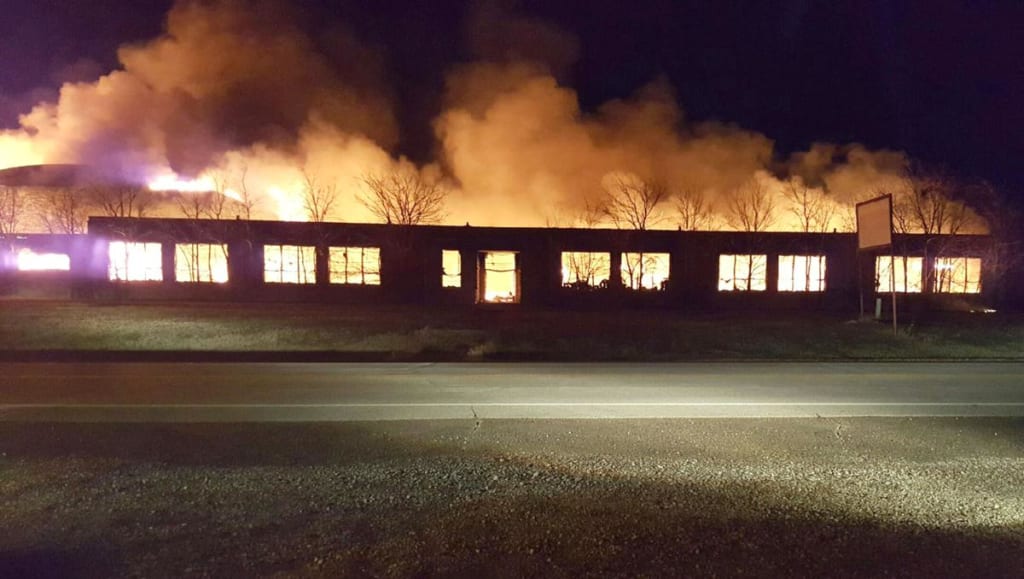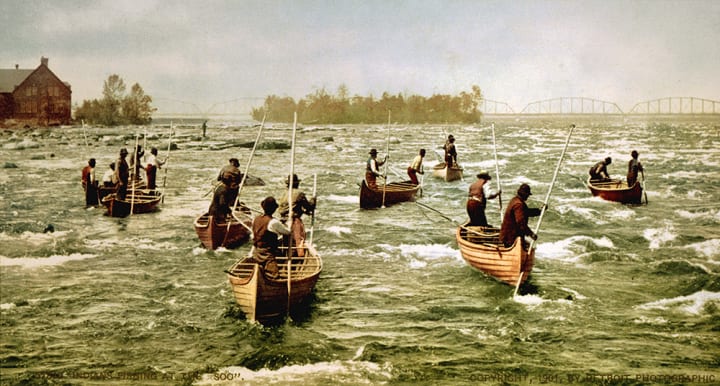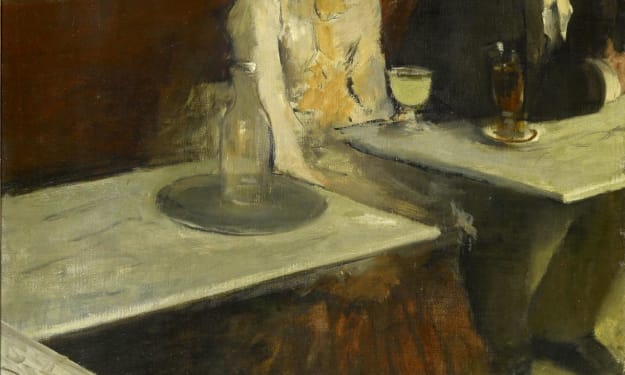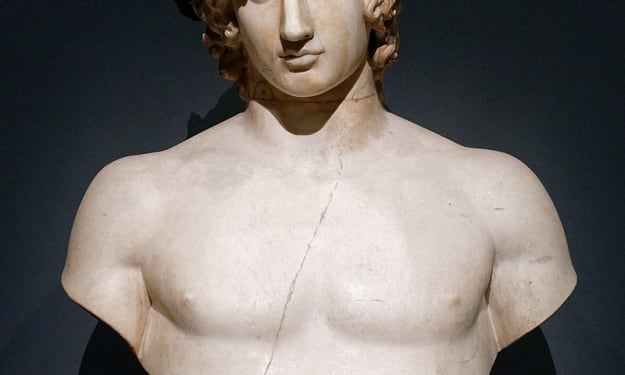Garden Indian Residential School
A country's great shame, generational trauma, and the raging river that draws us back into the past.

2021
This is the memory that will come to Terry when he reads an article at work about Garden Indian Residential School, where hundreds of the bodies of children have been found buried in shallow graves: the time he saw the bottom half of his father. The one that worked so that the top half could eat an orange, at night, with his son. Pulling the flesh apart with his fingers, tearing out the segments, one for Terry, one for dad, one for Terry, one for dad, as rain beats the windowsill.
*
1990
Terry stalks the hallway of Sir John Dunn High School. He is nine years old. McCrea Elementary, just across the soccer field, missing one boy. But Grade Four teacher Mrs Lambert doesn’t notice; she sits at the back of the room, staring at Bill Nye on the television that was wheeled to the front by the special needs assistant and school handyman, Mr Alan, who sits at the back of the room on the other side looking more at Mrs Lambert than at Bill Nye. Some of the kids whisper, “where’s Terry?”
For no reason but adventure Terry steps down the hallway at Sir James Dunn, relishing the noise of his shoes on the lacquered linoleum floor. Class is in session. He’ll be safely back at McCrea, he reasons, before the next period bell.
Then, around the far corner of the hallway, pushing a soapy bucket and a mop, comes Terry’s father. He sees his son and stops. Terry looks back at him. Why isn’t dad, Terry thinks, at the office? Why isn’t he dressed up in his suit and tie? Why is he pushing a mop in Sir James Dunn High School?
*
“The Dunn” was one of a trio of schools now on the site of an old First Nations Boarding School called Garden Indian Residential School, which one hundred and twenty-six years ago to the day was burned to the ground by a boy named Jonathan Schoolcraft who secretly called himself Waubojeeg.
The image of a burning school flashes in Terry’s mind, there on the linoleum, staring at his father. A memory in a memory. It’s an unsettling image, but he can’t shake himself free from it. It's as if it has reached up out of the ground and grabbed him.
*
1890
The moon hits the tree. This is Waubojeeg’s signal. He crawls out of bed, carefully lowers himself to the dirt floor. His very first imperative, to wake no one, fails almost immediately; Peter Gardner, the tiny boy with rickets and ringworm who sleeps in the bunk underneath Waubojeeg, stirs, turns over, watches his bunkmate hop down.
“Jonathan, what are you doing?” he asks in English.
“Nothing. Go back to sleep,” Waubojeeg replies in Anishinaabeg.
Peter hesitates, then responds in the same language. “You aren’t supposed to be awake. Tommy said that Headmaster has spies in every dorm. I could be a spy.”
“I don’t think you’re a spy, Peter. Go back to sleep.” Waubojeeg makes to creep toward the door but Peter grabs his nightshirt.
“It’s not worth it, Jonathan,” he reverts to English. “Whatever you’re doing, it’s not worth it. You’ll get in trouble and you’ll get the rest of us in trouble too.”
Waubojeeg hesitates. He whispers, “I’ll just be a minute,” and tiptoes to the door that leads out onto the quadrangle.
Outside the moon has crept further behind the tree. It’s a cool night in September. The grass under Waubojeeg’s bare feet is damp. The blades tickle. Shards of pine cone poke his soles. A soft breeze from the north carries the scents of the forest, which stretches from the north side of town, unbroken, all the way to the Arctic Circle thousands of miles to the north. Waubojeeg doesn’t think, “All of this was ours.” He isn't angered. He doesn’t consider any final escape.
All the boy thinks about, pausing for a moment under the stars, is that the night is colder than he’d expected. He shivers and presses on, making for the chapel at the edge of the grounds.
The chapel is stone, quarried from the river. Big grey boulders crudely masoned with a steep slate roof that shuffles off rain like a whaler’s oiled coat. Earlier that night before bed Waubojeeg had stolen away from evening prayers to stack a load of dry pine needles and wood scraps against the back of the chapel beside the basement doors. From his pajama pockets he takes out a small flint and tinder box he’d pilfered from the groundskeeper’s shack. He’s about to reach down to a little tuft of pine needles when he hears the sound of wheels rattling along the road a few dozen meters away. He tenses, remains still. He can’t see the carriage, it’s too dark; but can feel it rattle along. After waiting for what feels like hours for the sound to recede into the general song of night, Waubojeeg turns back to the pine needles...
He runs to the schoolhouse, his tinderbox gripped tightly by knuckles white in the moonlight. A long, low building. He crouches against the side away from the rest of the grounds, shaded from moonlight by overhanging oak trees.
After the schoolhouse comes the faculty dorm. Then the students’ dorm. And finally—though it should have been first—he comes to the Headmaster’s house. He approaches it from the backyard, presses his body through the hedges (the gate is locked) and emerges full of scrapes and cuts.
The Headmaster is asleep. If It had been awake, he would know. He would feel Its active mind, Its searching gaze, sweeping the school grounds like an arc of light from a tall lighthouse. Instead, from the Headmaster's house Waubojeeg feels merely a soft rise and fall, rise and fall, like the back of a winter bear. Small thoughts jet out of the beast, cast out like kicking in a dream. Waubojeeg can feel them. Unsafe thoughts. Not thoughts of hate; the Headmaster is incapable of hate, because hate is a human thing. Hate comes when someone stands in front of what you want. But so far nothing has stood in front of what the Headmaster wants. The unsafe thoughts that Waubojeeg can feel arcing out of the windows, up through the chimney, are fragments of violent enterprise, angles of plan.
*
1990
Terry, rooted to the spot in the hallway of Sir James Dunn High School, can feel thoughts fleeing from the ground under the school up into the air, like steam emanating from a bubbling hot-spring. They’re deafening, incessant, piled on top of each other in a pulpy mass. He wants to run back to Anna McCrea, back to class, back to Mrs Lambert and Bill Nye and Grade Four. But he’s stuck. Not in a moment, but between moments. At the other end of the hallway his father faces him, also frozen between moments.
*
1890
Waubojeeg can feel orange light coming over the top of the backyard hedges. He has to act quickly. Despite the terror, he approaches the back door and tests the knob. Unlocked. He lets himself in and proceeds through the kitchen, which is immaculately clean, everything in its right place, looking as if it has never once been used. Moonlight mingles with firelight through the window and falls on the tiled floor. Dining room. Sitting room. Waubojeeg starts to pull furniture together into a big pile in the center of the room, stacks chair on chair, upturns a sofa, takes paintings off the walls and tosses them on top. The other fires have started slowly, but this fire needs to catch fast and burn quick.
Waubojeeg takes out his tinderbox and sprinkles some dry paper scraps onto the top of his fuel pile. Before scraping the flint, he looks at the staircase that runs beside the front door and up to the second story. Somewhere up there, Waubojeeg thinks, is a sleeping monster. Should he creep upstairs and take a knife to the thing’s neck? In one quick, stealthy blow, save them all, Ojibwe and Europeans alike, from this nameless thing?
The staircase is immaculately dark. No window shades are down, it's a full moon, the fires outside are starting to catch, but the staircase is pitch black. The steps are lined in carpet. It’s the softest thing Waubojeeg has had under his feet since they caught him and sent him to the school. The step creaks. The next creaks more...
Ojibwe boys from the Garden River Band are running out of their dormitories and onto damp grass. Above, the moon is bright. Jupiter sits directly beside it. The whole small collection of buildings, all built of unfinished bare log (except for the Headmaster’s house, which is painted white, and the chapel, which is stone), are aflame. One teacher, a young women with a horse face and round glasses, is still pulling on her nightgown. Beside her the custodian is stepping into his overalls and nearly falling over. From the other side of the grounds the girls are starting to wake up and pile out onto the grass.
Waubojeeg, panting, stands at the far end of the grounds close to the road behind a thin copse of trees.
The Headmaster’s house is totally ablaze, and only after the windows on the ground floor burst outward from the heat do they see him stride out the front door. Though sweaty and with streaked with soot, he is immaculately dressed. He betrays no fear. His neck, Waubojeeg sees with terror, is intact, unwounded. It’s as if the Headmaster had gone to sleep in his Sunday clothes and only woken up by luck.
The Headmaster approaches the knot of teachers and staff, and mutely waves off their concern. He begins to speak to the group, but Waubojeeg is too far to hear.
Even if he could not kill that thing, at least he’d be able to set it back by destroying the school. But standing here behind the tree and watching the huge pale man gesticulate at the students and the adults, silhouetted against the flames, the boy feels a deep, terrible fear. This is no fear of the unknown.
The silhouette grows and begins to change form.
*
1990
In the Sir James Dunn corridor, Terry tries to open his eyes but can’t. He tries to think of his father, but can’t call his face to mind or picture the sound of his voice.
In the memory, the boy who calls himself Waubojeeg falls to the ground and scurries around the base of a tree trunk. He puts his hand over his mouth to keep from screaming. A few kilometers in front of him, behind a thin spread of trees—the ubiquitous maples, which now do not seem to be Waubojeeg’s friend but laugh at him with their broad leaves and mock him with their numbers, as if to say look how many of us there are, and see how there’s only one of you!—runs the River.
If you listen closely, you can hear it even from this distance. The Europeans call it St Mary’s River. Baawitigong, the cascading rapids. No force of evil can bend the River bad, just as no force of good can bend the River good. That’s what makes it the River: it is itself. It is neither bad nor good; it is the demarcation between bad and good. That’s why to Waubojeeg it means safety. Being bad, the creature can’t enter the River. Being both bad and good, unappraised, unjudged, Waubojeeg can.
Across the years, Terry sits on the linoleum floor. His eyes are still clenched shut. He tries to tell the boy in his memory, get up! run! but the boy can’t hear him. He stays behind the tree, biting his hand. The thing that calls itself the Headmaster of Garden is searching for him even as It continues placating the group on the lawn. He can feel Its gaze moving through the trees like a beacon of dark light. If I move one centimeter, Waubojeeg thinks—a millimeter, less—then the thing will find me and bind me to the spot to be fetched at leisure.
Waubojeeg focuses on the sound of the River. He pours all of his thought into it, sliding into the current. It becomes very easy to be still. His stillness creates an eddy in time. This, he realizes, is why it is such a powerful spell. He eschews all event. The moment before cannot reach the moment that will come next. It’s an unbridgeable gap. The event—a twitch of the toe, a wiggle of the finger—will indeed come, and it will usher him over to the other side of the time-eddy, but it will be something magical, an uncaused cause. It will have no knowledge of the event that came before it and be a product only of will.
He holds his breath. Here, in the space of the moment between the falling of his chest and the wiggle of his toe, Waubojeeg is safe. He knows it. Terry knows it too. The thing’s searching gaze sweeps through; it pauses on Waubojeeg’s tree; it moves on and is lost.
Under the bare feet of the pupils, faculty, and staff of Garden, the bodies of countless children hold their breaths in sympathy with the boy above them.
Waubojeeg retrieves himself from the eddy, wiggles his toe, and rises. He runs off into the darkness with orange flame at his back. The odor of burning wood mixes with humidity from the River.
He disappears into maple trees that grow by the banks. Ahead, a dark expanse slowly reveals itself under a glittering night sky.
Cold water envelopes his feet. Coursing waves beat around his thighs. He puts his palms against the rush of water, which pushes him like the force of a hasty promise, a promise made by a man to a child, as fragile as fatherhood, uncertain, but as strong as a raging river.
*
1990
Terry opens his eyes. He hiccups. At the other end of the corridor, his father seems to come unstuck too. Slowly he turns his gaze from his son to the mop. He dips it in the bucket and slides it across the linoleum in long, slow arcs. Wordlessly, Terry turns and strides out the doors of the high school and onto the field joining it to the elementary school, no longer pondering the promises of adulthood.
He strides over the graves of children.
*
2021
Now, he’s a father himself. He’s just read an article in the paper about First Nations Boarding Schools in Canada. Garden Indian Residential School is mentioned. He skips out of work early and walks home.
Managing to slip around to the front of his house and enter in through the back door, Terry creeps upstairs (his wife is in the kitchen, sitting at the table and writing in her journal; the kids are at school) and takes a shower. The water is cold, but he lets it fall over his skin. It flows and swirls around his feet, catches in little rapids, flows with force down the drain around his bare feet.
Terry’s father comes back to him in a flood of memory, a feast of presence. The images pass before him like curls of wave before innumerable boats beating against the rapids, drawing him back into his past.

About the Creator
Eric Dovigi
I am a writer and musician living in Arizona. I write about weird specific emotions I feel. I didn't like high school. I eat out too much. I stand 5'11" in basketball shoes.
Twitter: @DovigiEric






Comments
There are no comments for this story
Be the first to respond and start the conversation.